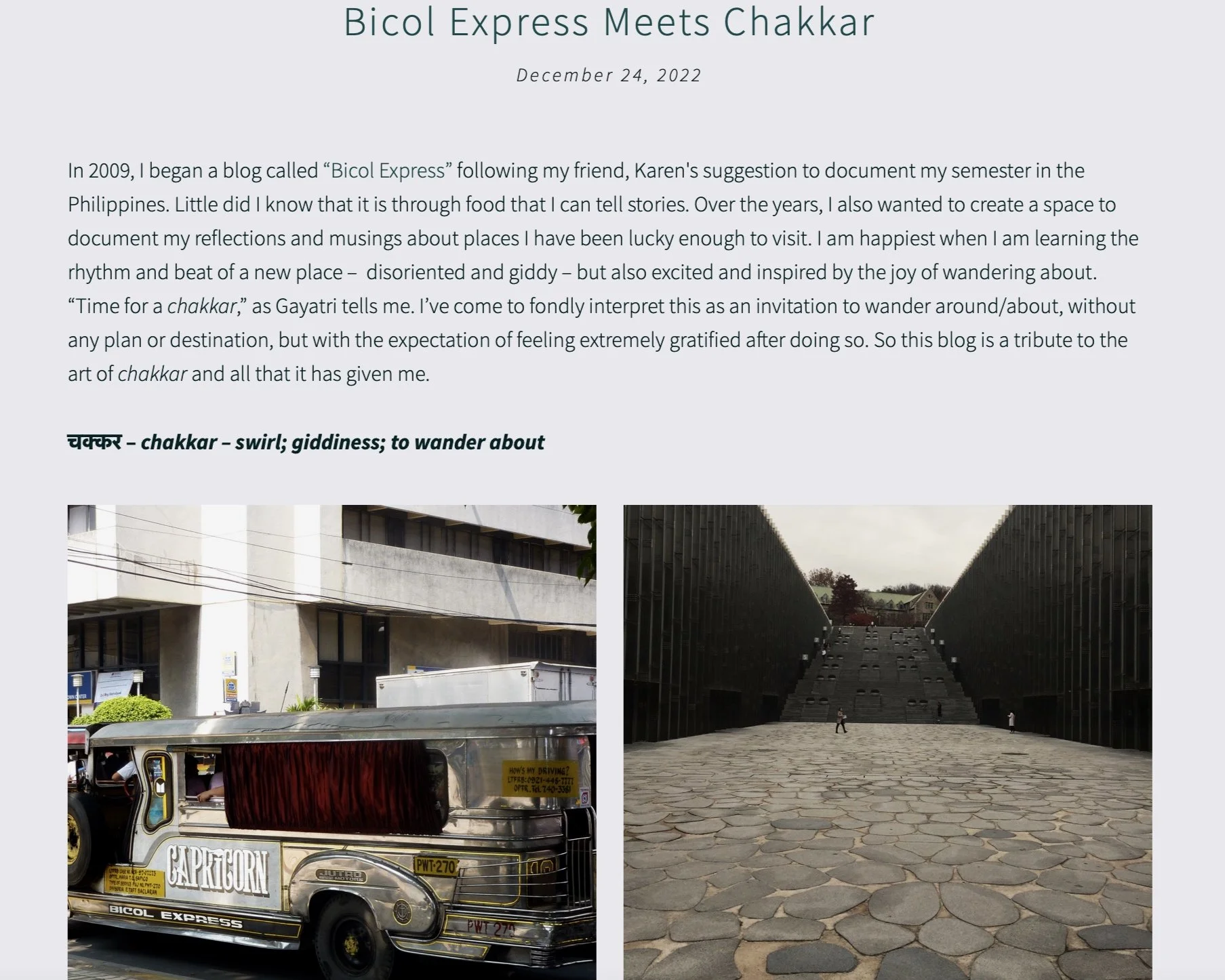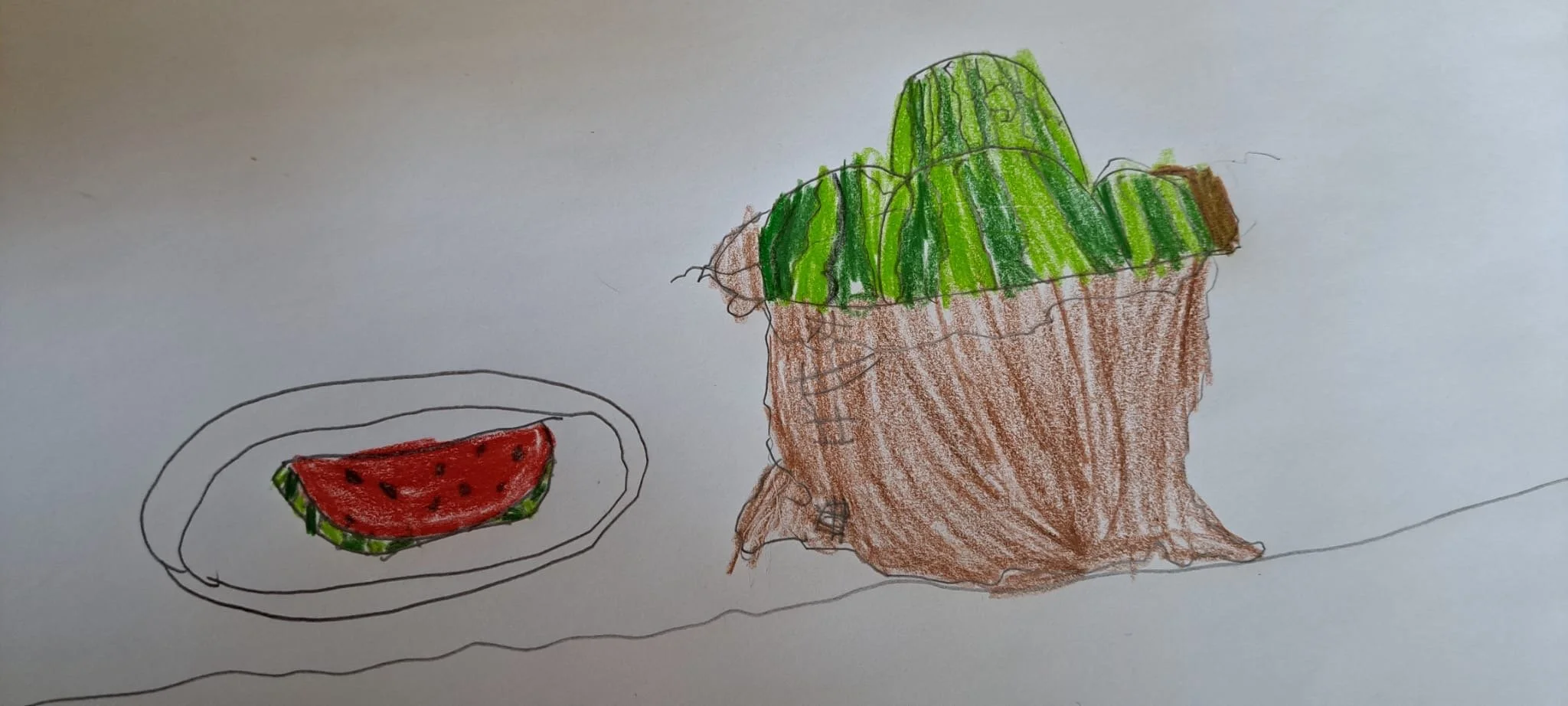Tatang made a point not to miss our birthdays, especially when his son, my father, was working overseas in the Middle East. He would make the long journey from Candaba, Pampanga to our home to deliver his greetings to his grandchildren. I know that journey had to take hours and multiple forms of public transportation – tricyles, a jeepney, a bus – alongside a lot of walking. He never mentioned his arduous journey. He was a very quiet man, just like my dad.
“Sack of Watermelons” by Cash, September 24, 2024
During my brother’s elementary school graduation; From L to R (in the back: My dad and Tatang; and in the front: me and my siblings). My brother is holding his certificate and my sister is holding her skirt.
I remember one particular visit where he suddenly appeared by the gate of our house like an apparition, carrying a very heavy sack. We lived in a place called Mikesell Subdivision in Las Piñas, Metro Manila and many of the years spent there were during the times my father was working overseas, in Libya. Two women - Ate [1] Biña and Ate Lydia helped Ma take care of the three of us kids while she worked full time at the Indonesian Embassy. I don’t know how we ended up in Mikesell. It was a creepy neighborhood – with very few houses and lots of empty lots. Rumor had it that there were several “nuno sa punso”(“old man of the mound” or mystical spirits) who lived on what looked like ant hills on those empty lots so we were never allowed to wander around on the streets for fear of having a spell cast upon us if we mistakenly stepped on these spirits. Our house attracted many creatures – from wasps that would build their nests inside our mailbox, and sting us when we reached inside (my brother got stung), to snakes, whose skin we would occasionally find while playing near the driveway. During the summertime, my siblings and I tried to entertain ourselves by pretending we were running a store front. I would sell pretend food, and they would buy it. One day we had the brilliant idea of selling real food - ice candy. So, we made some Tang juice, put it in ice candy packets, froze these packets, hung up a sign by the side of our gate, and sold these frozen treats for a few centavos. Kids from the neighborhood actually came and bought them. We were so happy. But we hardly sold any; we ended up just eating the ice candy ourselves because it was so hot outside. One day, my brother snuck into the freezer to eat what he thought was one of our frozen ice candies. When he started sucking on it, his face turned sour. It turned out that Ate Biña used an ice candy wrapper to pack chicken gizzards. My brother was horrified when Ate Biña told him. We all laughed for days. Other than that, most of our free time was spent indoors watching TV, dancing, and taking mandatory naps after lunch, which we found to be absolutely dreadful. My brother always had trouble and usually failed Ate Lydia’s eye inspection – where she would come to inspect whether we were really asleep by watching our eyes move. My brother could not control his eye movement. I excelled at it. My sister always fell asleep just fine or even if she didn’t, she was Ate Lydia’s favorite, so she got away with not taking a nap. I forget what the punishment was for faking a nap. All I remember was the longing I had for it to be over so I could partake in the merienda (snack) that was promised at the end of a nap: a glass of ice cold Tang and a small bag of chips, biscuits, or on special occasions, turon (slice of bananas with brown sugar wrapped in spring roll wrapper and deep fried).
Tatang’s visit interrupted our mundane everyday routine. When he suddenly appeared by that gate, we all ran to greet him- awkwardly doing the “mano po” – taking the back of his hand and pressing it against our foreheads as a sign of respect. We didn’t know what to say to him so having a conversation was out of the question. I was 9 and was still very shy or just did not have the skills to talk to an unfamiliar adult, even if he was my grandfather. Ma was at work. We just sat around quietly. I think he talked to Ate Biña and Ate Lydia to ask how things were, how we were, and checked out where we lived. He didn’t come inside the house and instead sat on the patio – probably to get some fresh air and rest. He must have been tired from the journey. Ate Biña offered him a drink – I think it was coffee, and he sat there sipping it, quietly. He then opened the sack – a rice sack he reused for the occasion– which revealed several watermelons. They looked so big, all deep green in color, and heavy. He said they were from the bukid (farm) and that they would be very sweet. He was so proud of his watermelons. How did he carry all of them, all the way from Candaba? He asked us to save the seeds, which could be later dried and roasted out in the heat to become butong pakwan (roasted watermelon seeds). Dad loved watermelons. He could eat a whole watermelon or a bag of butong pakwan in one sitting. So, I guess when Tatang brought us these watermelons, he was also bearing gifts for his son. Tatang only stayed for a couple of hours and then before he left, he summoned us and gave each of us a few pesos. We were happy to get some extra “allowance” to buy a toy or a treat during snack time. I cannot remember whose birthday it was on that visit. But that did not matter. He celebrated all of us.
We used to take trips to Candaba to see Tatang during fiestas, but when my dad left for overseas work, that stopped. Instead, he came to visit us. I can imagine he must have been worried not only about his youngest son working far away, in Libya, but also about the family he left behind. We were fine but we also felt our dad’s absence and were confused at times about why he had to work so far away. When Tatang visited, he never stayed long or overnight because he needed to get back to his farm. But when he visited, it was like having a piece of our dad there. He would remind my brother to play basketball and me to study hard so I could become a doctor.
Last year, I found a letter he wrote in 1989 to my parents. It was only our fourth year in the US as immigrants and those years were especially hard, financially, for my parents. Based on his letter, I think my parents shielded him from knowing that we were struggling. Tatang’s letter was filled with affirmations and hopes for our new life. He told my parents not to worry about sending money or a balikbayan box [2]because he assumed we had a lot of expenses to worry about. He talked about his farm and the melons they were harvesting, my aunts, my cousins, my late grandmother and her faith that he claimed allowed their children to succeed in school. He talked about his deteriorating eyesight, yet he filled that page with such beautiful sentiments and elegant penmanship. He loved all his children and grandchildren unconditionally and would let you know in so many different ways – whether through the arduous journey to bring watermelons from his farm, or to write us letters filled with hope, gratitude, and belief that we will make it through. Tatang died a year after he sent this letter - on February 6, 1990. I didn’t get a chance to see or thank him before he passed away, but I am grateful that he left me with this memory… and a story that I can share with my siblings and his great grandchildren.
As a tribute to Tatang – I pass on this sack of watermelons with wishes of a happy birthday – maligayang kaarawan to Corinne yesterday, Cash and Maricris in August, Kayla in June, Adree in November, and Brody, Sonny, and Zayne in December, Ma in February. Here’s hoping that they will share and keep this story and the knowledge about their elders and ancestors alive for the next generation that follows them.













